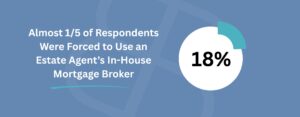Conditional Selling in Estate Agency: A Cry for Regulation [July 2025 Study]

New research from Boon Brokers reveals that many homebuyers are feeling pressured by estate agents to use in-house mortgage brokers, while most remain completely unaware that estate agents themselves are not subject to any formal regulation. Download the full research file in the footer of this article.
Key Findings:
- 78% of respondents believe estate agents should not have direct associations with mortgage brokers
- 80% of respondents experienced direct crossover between property access and in-house mortgage promotion
- 85% of respondents did not know estate agents are not governed by any formal body
- 18% of respondents said their offer would only be considered if they used the estate agent’s in-house mortgage broker
- 96% of respondents state that stricter regulations for estate agents are necessary
- 52% of respondents said they were strongly encouraged or required to use the estate agent’s mortgage broker
- 60% of respondents believe fair access to property viewings should be guaranteed regardless of broker used
Data Summary:
| 1,000 Respondents – TLF Research |
| All participants used an estate agent for a residential property transaction in the past 2 years. |
| All age ranges covered |
| Participants from North, East, West and South of England |
This research was inspired by BBC’s Panorama documentary, Undercover Estate Agent, which revealed how some buyers are being pressured or misled by estate agents working with in-house or partnered mortgage advisers to secure property viewings and purchases.
In the wake of this documentary, a growing concern has emerged over transparency in the UK housing market, raising a key question: are estate agents acting in the best interest of their sellers, or exploiting insider knowledge of buyer’s finances to boost their own profits at the seller’s expense?
Boon Brokers commissioned this research to explore whether these concerns were isolated cases or widespread across the UK. Our research found strong evidence that many consumers experience pressure from estate agents, highlighting significant gaps in awareness and a clear demand for urgent regulatory reform.
In addition, the findings point to a much wider market issue. When estate agents and mortgage brokers operate too closely, it opens the door to the risk of distorting competition and inflating house prices. This lack of transparency, as the survey suggests, undermines consumer confidence, making one of life’s biggest financial decisions even more complex.
House Viewings Locked Behind Estate Agents’ Brokers
The research revealed that 80% of respondents experienced a direct crossover between property access and the promotion of in-house mortgage brokers.
This stat alone shows that there is a seemingly intricate relationship between estate agents and their in-house mortgage brokers, with buyers frequently persuaded or compelled to use the in-house broker out for fear they would be denied access to property viewings.
While estate agents should offer viewings to all buyers – whether they’re cash buyers or using independent mortgage and financial advice – the findings suggest a concerning level of gatekeeping. In many cases, agents appear to hold dominant control over access to properties, effectively placing locks on the very ‘front door’ of the homebuying process.
Specifically, the research found that 1 in 5 buyers (20%) were only allowed to view a property if they used the estate agent’s mortgage broker. Additionally, 42% of respondents had their property viewings tied directly to mortgage appointments arranged by the estate agent with 18% of respondents being told that their offers would only be considered if they used the estate agent’s in-house mortgage broker.
These insights demonstrate how the latest research aligns with the shocking BBC reveal, confirming that such estate agent and in-house broker arrangements would appear to be widespread across the UK.
When access to property viewings is conditional on using an estate agent’s in-house mortgage broker, buyers and sellers face a double limitation: not only are property viewings heavily restricted, but buyers’ freedom to access impartial mortgage advice is also significantly compromised.
This crossover drastically limits the pool of properties buyers can see, predicated on whether they engage with the estate agent’s in-house or partnered mortgage service. Ultimately, this lack of choice and transparency will negatively impact consumers.
The Pressure Tactics Towards In-House Mortgage Brokers
The research found that more than half of the respondents (52%) felt pressure from their estate agents, reporting that they were strongly encouraged or even required to use the estate agent’s mortgage broker. This shocking stat reveals a clear experience by many that they don’t just face a gentle nudge from their estate agents – they’re made to feel compelled to comply.
Additionally, the research uncovered age to play a significant role in how and when this pressure is applied. For example, 45% of respondents aged 25 to 44 years old reported that they were only allowed to proceed with a property if they used the estate agent’s mortgage broker. In direct contrast, just 6% of respondents who were aged 55 years and over had a similar experience.
These age-related differences suggest a trend of exposing inexperience: younger buyers, many of whom are first-time purchasers, are more likely to experience coercion or pressure to use estate agents’ in-house mortgage brokers.
In the context of first-time buyers, who often rely heavily on guided information from an unbiased source in order to make informed decisions, this will put them at a huge disadvantage in their decision making on what is often the most significant purchase of their lives – their home.
Most notably, the research demonstrates a potential shift towards more aggressive, conditional selling tactics that target buyers and sellers of property who may be less familiar with the processes and more reliant on guidance.
Such conditional selling practices place significant restrictions on buyers’ choice and independence. Being pressured to use a particular mortgage broker – often under the threat of losing access to property viewings or having offers deprioritised – effectively locks buyers out of impartial mortgage advice. It limits their ability to explore competitive mortgage options and subsequently undermines a fair and transparent housing market.
Unregulated Advice in the Property Market
With the research revealing widespread pressure from estate agents to use in-house mortgage brokers, it’s unsurprising that the research found many buyers are unaware of just how unregulated estate agents can be.
An overwhelming 85% of respondents reported that they did not know that estate agents are not governed by any formal regulatory body.
Unlike mortgage brokers in the UK who are regulated by the Financial Conduct Authority (FCA) and solicitors who are regulated by the Solicitors Regulation Authority (SRA), estate agents currently operate without any mandatory governing body in the UK.
This major gap in public understanding is worrying, especially as 96% of those surveyed believe stricter regulations are urgently needed. It’s clear that consumers want better protections and accountability from estate agents who play a pivotal role in property transactions.
For these reasons, the research not only reveals a widespread account of conditional sales pressure but an urgent need for clearer regulation to protect consumer choice, especially for younger and less experienced buyers.
Buyers Want Fairness and Independence
Respondents expressed a clear call for reform, with 60% stating that all buyers should be guaranteed access to property viewings – regardless of which mortgage broker they choose – and 78% agreeing with a statement that estate agents should not hold direct associations with mortgage brokers.
There should be no association between brokers and estate agents. In conveyancing, the same solicitor firm – including subsidiaries – are not allowed to act for both buyers and sellers as it creates a conflict of interest. The same is true for estate agents that own mortgage brokerage firms or vice versa. The BBC’s Panorama documentary highlighted this clear conflict and how it causes unfair outcomes for consumers, who are often purchasing the most significant asset of their lifetime.
Gerard Boon Managing Director (B.A Hons, CeMAP, CeRER)
This very principle is reflected in Law Society guidance, which prohibits conveyancers from acting for both parties in a transaction due to conflict of interest risks. Extending these similar protections to estate agents and mortgage brokers could help ensure impartial advice and greater fairness.
Legislation Reform to End Conditional Selling
The summary of the research mounts to one specific public outcry: to restore fairness and transparency in the UK housing market, legislative reform is urgently needed.
A clear and effective solution would be to prohibit estate agents from holding any direct or indirect associations with mortgage brokers, including the sharing of consumer enquiries or ownership structures. By removing these conflicts of interest, legislation would ensure that all buyers receive unbiased, FCA-regulated mortgage advice, untainted by sales incentives.
This measure alone would immediately dismantle the systems that are currently allowing estate agents to gatekeep access to properties and pressure buyers into financial products that may not serve their best interests. In doing so, it would also unlock access to properties, improve transparency, protect financial interests, and ultimately make the housing market fairer, more competitive, and more trustworthy.
Ultimately, legislative safeguards are essential, both to protect buyers’ financial wellbeing and to rebuild trust in the housing market. Removing the restrictive practices currently exercised by some estate agents would unlock more homes for genuine competition, increase buyer choice, and create a healthier balance of supply and demand.
In response to the BBC Panorama investigation, industry voices and concerned consumers are already taking action through a growing petition to regulate UK estate agents to enforce consequences for conditional selling. The petition calls on the government to introduce enforceable legislation that will prohibit conditional selling and hold estate agents accountable for any unethical practices.
Without such a reform, the housing market will remain distorted, fuelled by murky in-house relationships, reduced competition, and practices that unfairly limit access to homes. Clear guidelines and enforceable legislation is the only way to ensure that housing in the UK becomes truly accessible, transparent, and fair for all.
Notes to the editor
Research was conducted between 14th – 22th July 2025 amongst 1,000 applicants.
About the Researcher:
The Researcher for this article is Gerard Boon (B.A Hons, CeMAP, CeRER). Mr. Boon is the Managing Director of Boon Brokers Limited, a Directly Authorised Online Mortgage, Insurance & Equity Release Brokerage in the U.K. Boon Brokers boasts over 9,000 clients across the country and is quickly scaling year on year. Mr. Boon is passionate about Artificial Intelligence in the industry. During his studies at the University of Leeds in 2018, he achieved a First classification for his dissertation project titled “Artificial Intelligence in Financial Intermediation: An Investigation into the Prospects of Robo-Advice Developments for Independent Mortgage Brokers in the United Kingdom”. Since 2018, AI technology has rapidly developed. Mr. Boon is hoping to update his research on the topic following this survey.
Download the Full Results – Conditional Selling Survey – July 2025









